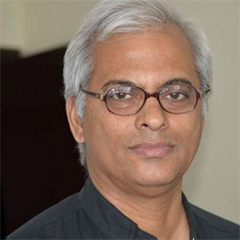DRESDEN: Brandishing suspect flags and even posters calling for opponents to be sent to the gallows, the conspicuous presence of far-right protesters at week-long tractor blockades by farmers have sparked fears that extremists are seeking to exploit the protest movement. During a rally this week by German farmers angry at cuts in subsidies, police separated several dozen far-right supporters from the main demonstration. The extremists from the “Freie Sachsen” group were brandishing royalist flags and mocked-up pictures of German politicians dressed as prisoners during the Dresden protest.
They are among radical groups that German authorities increasingly fear are seeking to co-opt the demonstrations, which began in December and have spread nationwide. Chancellor Olaf Scholz issued a warning on Saturday against the “extremists”. “When the protests, legitimate by themselves, turn into anger and contempt for democratic procedures and institutions, we all lose,” Scholz said in a statement and a video. “Disagreement is a part of democracy,” he said, adding however that “anger is stirred up in a targeted way”. “The extremists... show contempt for any compromise and poison democratic debate. “It’s a toxic mix which should concern us and which also concerns me greatly,” Scholz said.
The protests escalated last week, when tractors blockaded roads and caused widespread disruption. Another major rally is planned for Monday in Berlin. The farmers and some of their supporters have sought to distance themselves from the far-right groups. But the extremists seem determined to latch on to the protest movement. The “Freie Sachsen” group, which brings together monarchists, conspiracy theorists and the far right, has posted messages of support for the farmers online. Other groups, like neo-Nazi outfit “Third Voice” and nationalist movement “Ein Prozent” (One Percent), have called for strikes and riots, according to the interior ministry.
They are accused of being behind controversial stunts such as setting up gallows on the side of motorways and stopping Economy Minister Robert Habeck from disembarking from a ferry.
Habeck, from the Green party, has been a favorite target of the protests. Stephan Kramer, intelligence service head in the eastern state of Thuringia, accused the far-right groups of “constantly and systematically seeking to subvert any form of legitimate public protest”. Since the start of the protests, farmers’ federation leader Joachim Rukwied has repeatedly insisted: “We don’t want right-wing and radical movements in our demonstrations.” The farmers’ anger stems from a government decision to cut subsidies and tax breaks on diesel and agricultural vehicles. The move was part of efforts by Scholz’s coalition to find savings after Germany’s top court ruled in November that the government had broken debt rules.
The ruling blew a huge hole in the government’s spending plans. As well as fringe groups, the country’s main far-right force, the AfD (Alternative for Germany), has sought to capitalize on the protests, which have won widespread public sympathy. The party says it intends to make the defense of rural areas a central plank of its campaign for key elections this year in Thuringia, Saxony and Brandenburg.
According to a recent opinion poll commissioned by broadcasters RTL and NTV, the AfD currently enjoys over 30 percent support in the three eastern states. Created in 2013 as an anti-euro outfit before morphing into an anti-immigration party, the AfD is enjoyed a resurgence as Germany struggles with an upsurge in illegal migration, as well as a weak economy.—AFP
Despite the presence of extremists at the Dresden protest, many taking part vehemently rejected any links to the far-right supporters, insisting their sole aim was to support the farmers.
“Don’t film them. They don’t represent us,” a woman holding a sign in support of the farmers who asked not to be named told AFP. Luisa Hochstein, 26, who runs a small dairy farm in the region, added: “These rallies are about our future. This has nothing to do with right-wing extremists. That’s not why we’re here.” – AFP










